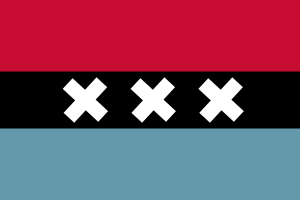The PCB wiki has now been archived and is read-only. |
Difference between revisions of "Deneira"
(history) |
(flag) |
||
| Line 1: | Line 1: | ||
=== City surroundings, buildings and geography === | === City surroundings, buildings and geography === | ||
[[File:Ancient Deneiran Flag.png|thumbnail|The first deneiran flag, made by the dutch]] | |||
The city of Deneira is located in the [[Free Provinces of Nedair]], in a state of semi-autonomy with the [[Grand Repubblic of Barcala Diuettum]], as the most north-eastern province in the repubblic. The territory is mostly hilly, that were lowered in a massive effort by the Gertian Empire, to improve the city's production and massive drenages, to permit the docking of bigger ships. | The city of Deneira is located in the [[Free Provinces of Nedair]], in a state of semi-autonomy with the [[Grand Repubblic of Barcala Diuettum]], as the most north-eastern province in the repubblic. The territory is mostly hilly, that were lowered in a massive effort by the Gertian Empire, to improve the city's production and massive drenages, to permit the docking of bigger ships. | ||
| Line 8: | Line 9: | ||
==== The early period ==== | ==== The early period ==== | ||
The city of Deenaairart (ancient name of the city) was founded in 1343 by dutch merchants in search of new trading opportunities in the black sea. The city prospered, till the rise of the Gertian empire, that blocked the access of the city traders to the silk road. That started the decline of the city, that culminated in the conquest of the city by the Gertian empire in 1464, that made the city part of the empire and forced the city to destroy the fortifications. | The city of Deenaairart (ancient name of the city) was founded in 1343 by dutch merchants in search of new trading opportunities in the black sea. The city prospered, till the rise of the Gertian empire, that blocked the access of the city traders to the silk road. That started the decline of the city, that culminated in the conquest of the city by the Gertian empire in 1464, that made the city part of the empire and forced the city to destroy the fortifications. | ||
==== The mid period ==== | ==== The mid period ==== | ||
[[File:Deneiran revolutionary flag.png|thumbnail|Deneiran Revolutionary Flag, during the war for indipendence]] | |||
Under imperial occupation the city prospered, trough ingent investements by the cpital, transforming it in the trading hub of the empire, however the unrest remained and big armed forces were needed to suppress the separatist rebels. The tensions grew, until the great revolt of the 1502, that liberated the city and the surroundings. To protect itself from the empire, the city allied its neighbours that will become the [[Federation of the Free Cities]], in 1687. During the first half of the sixteenth century, the city had a massive hungarian immigration, because of the constant Gertian raids in the hungarian countryside. The city accepted the flux of immigrants, changing the demographics of the city forever. The city was renamed Deneira, and the bonds from the allied cities grew stronger and stronger. The century didn't seen huge military conflicts, so is reputated for the historian as the great century of peace, which saw the city prosper, as the city started the trade with the slav empires of the north. During the 1600 the city was hit in a serie of disasters, that almost destroyed the city. In the year 1627 a massive conflagration from the trees in the mountains burnt the 75% of the city, killng a quarter of the population, and leaving half homeless. Then the plague reached the city in 1673, leaving the city in a terrible condition. In 1687, the city formed the [[Federation of the Free Cities]] with its allies. The leader of the federation was the city of Deneira. | Under imperial occupation the city prospered, trough ingent investements by the cpital, transforming it in the trading hub of the empire, however the unrest remained and big armed forces were needed to suppress the separatist rebels. The tensions grew, until the great revolt of the 1502, that liberated the city and the surroundings. To protect itself from the empire, the city allied its neighbours that will become the [[Federation of the Free Cities]], in 1687. During the first half of the sixteenth century, the city had a massive hungarian immigration, because of the constant Gertian raids in the hungarian countryside. The city accepted the flux of immigrants, changing the demographics of the city forever. The city was renamed Deneira, and the bonds from the allied cities grew stronger and stronger. The century didn't seen huge military conflicts, so is reputated for the historian as the great century of peace, which saw the city prosper, as the city started the trade with the slav empires of the north. During the 1600 the city was hit in a serie of disasters, that almost destroyed the city. In the year 1627 a massive conflagration from the trees in the mountains burnt the 75% of the city, killng a quarter of the population, and leaving half homeless. Then the plague reached the city in 1673, leaving the city in a terrible condition. In 1687, the city formed the [[Federation of the Free Cities]] with its allies. The leader of the federation was the city of Deneira. | ||
Revision as of 13:11, 21 June 2018
City surroundings, buildings and geography
The city of Deneira is located in the Free Provinces of Nedair, in a state of semi-autonomy with the Grand Repubblic of Barcala Diuettum, as the most north-eastern province in the repubblic. The territory is mostly hilly, that were lowered in a massive effort by the Gertian Empire, to improve the city's production and massive drenages, to permit the docking of bigger ships.
The city
The city is a blend of dutch and budapestian canals, with a massive dock. The city is still in constuction, with the starter layout almost finished.
History
The early period
The city of Deenaairart (ancient name of the city) was founded in 1343 by dutch merchants in search of new trading opportunities in the black sea. The city prospered, till the rise of the Gertian empire, that blocked the access of the city traders to the silk road. That started the decline of the city, that culminated in the conquest of the city by the Gertian empire in 1464, that made the city part of the empire and forced the city to destroy the fortifications.
The mid period
Under imperial occupation the city prospered, trough ingent investements by the cpital, transforming it in the trading hub of the empire, however the unrest remained and big armed forces were needed to suppress the separatist rebels. The tensions grew, until the great revolt of the 1502, that liberated the city and the surroundings. To protect itself from the empire, the city allied its neighbours that will become the Federation of the Free Cities, in 1687. During the first half of the sixteenth century, the city had a massive hungarian immigration, because of the constant Gertian raids in the hungarian countryside. The city accepted the flux of immigrants, changing the demographics of the city forever. The city was renamed Deneira, and the bonds from the allied cities grew stronger and stronger. The century didn't seen huge military conflicts, so is reputated for the historian as the great century of peace, which saw the city prosper, as the city started the trade with the slav empires of the north. During the 1600 the city was hit in a serie of disasters, that almost destroyed the city. In the year 1627 a massive conflagration from the trees in the mountains burnt the 75% of the city, killng a quarter of the population, and leaving half homeless. Then the plague reached the city in 1673, leaving the city in a terrible condition. In 1687, the city formed the Federation of the Free Cities with its allies. The leader of the federation was the city of Deneira.
The late period
During the first years of the 1700, the city started to recover from the plague and changed completely architectural style. Till this day, the buildings in the city are still of the first half of the eightinth century. During the 30's of the century, the first serie of canals was built, to make the local river accessible by the sea, and connect the city to the Danube. With the new connection, the city had a new expansion in the docks and a first industrial boom, focused mostly on naval industry, becoming an important industrial center. Trough the canals, the coal was imported from the Danube.

